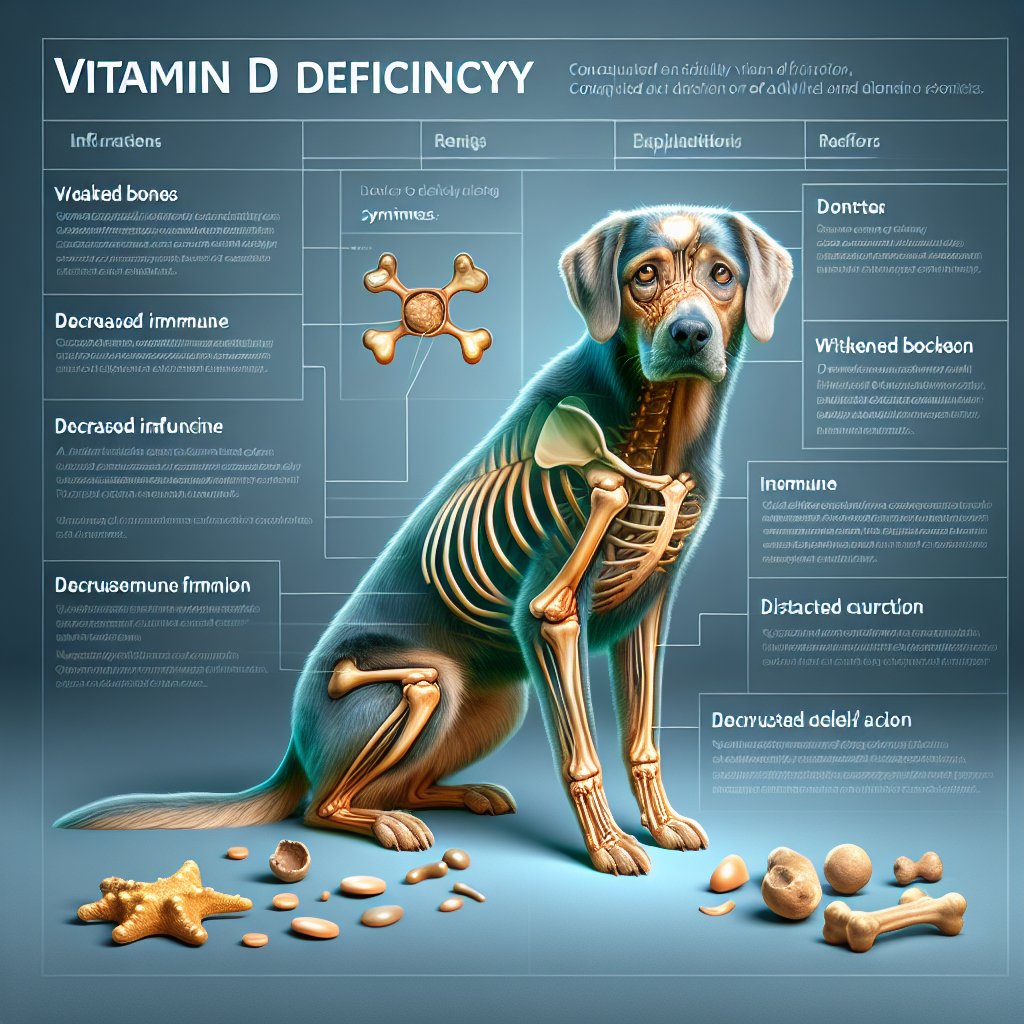Do Dogs Need Vitamin D? Exploring the Crucial Role of Vitamin D in Canine Health!
Do Dogs Need Vitamin D? Exploring the Crucial Role of Vitamin D in Canine Health!
Welcome, fellow dog lovers! Today, we are diving into a crucial topic that concerns the health and well-being of our furry friends: Vitamin D. You might be wondering, “Do dogs need Vitamin D?” And the answer is a resounding yes! Just like in humans, Vitamin D plays a critical role in the overall health of our canine companions.
Vitamin D is essential for dogs as it supports various bodily functions, including bone health, immune system function, muscle strength, and cellular growth. Adequate levels of Vitamin D contribute to your dog’s overall well-being, helping them maintain a healthy and active lifestyle. In fact, research has shown that a deficiency in Vitamin D can lead to several health issues in dogs, such as weakened bones, poor immunity, and a greater susceptibility to certain diseases.
So, as responsible pet owners, it’s crucial for us to understand the importance of Vitamin D in our dogs’ diet and lifestyle. Throughout this article, we’ll explore the fascinating world of Vitamin D and learn how we can ensure that our beloved four-legged companions receive the necessary amount for optimal health and vitality. Let’s embark on this enlightening journey together!

Functions of Vitamin D in Dogs
Vitamin D plays a crucial role in the overall health and well-being of our furry friends. Just like in humans, it has several essential functions in dogs’ bodies. Let’s delve into the various roles of vitamin D in canine health.
Bone Health
Vitamin D is vital for maintaining strong and healthy bones in dogs. It promotes the absorption of calcium and phosphorus from the intestinal tract, which are critical minerals for bone formation and strength. Without sufficient vitamin D, dogs can develop bone abnormalities and weaknesses, such as rickets or osteomalacia, leading to skeletal deformities and fractures.
Immune Function
Research has shown that vitamin D plays a significant role in supporting a robust immune system in dogs. Adequate levels of vitamin D help in regulating the immune response and reducing inflammation, thereby enhancing the body’s ability to fight off infections and diseases.
Cellular Growth
Vitamin D also contributes to healthy cellular growth and function in dogs. It plays a part in regulating cell differentiation, proliferation, and apoptosis, all of which are vital processes for maintaining overall cellular health and functionality.
Ensuring that our canine companions receive sufficient vitamin D is imperative for their overall health and well-being.
2. Natural Sources of Vitamin D for Dogs
Just like humans, dogs also need Vitamin D to maintain optimal health. The good news is that dogs can naturally obtain Vitamin D from various food sources and sun exposure.
Food Sources Rich in Vitamin D
Here are some food sources rich in Vitamin D that you can incorporate into your dog’s diet:
- Fatty fish such as salmon, mackerel, and tuna
- Egg yolks
- Beef liver
- Cheese
- Fortified dog foods
By including these foods in your dog’s diet, you can ensure they receive an adequate amount of Vitamin D to support their overall well-being.
However, it’s important to note that dogs also have the remarkable ability to produce Vitamin D in their skin through sun exposure, similar to humans. Spending time outdoors, especially in sunlight, can contribute to fulfilling their Vitamin D requirements naturally.
Do Dogs Need Vitamin D?
As responsible pet owners, we always strive to provide the best care for our furry friends. When it comes to their health, nutrition plays a crucial role. Just like in humans, essential vitamins like Vitamin D are also vital for our canine companions. Let’s delve into the importance of Vitamin D for dogs and explore the risks of deficiency.
Risks of Vitamin D Deficiency in Dogs
Vitamin D deficiency in dogs can lead to various consequences that can significantly impact their health. Research has shown that insufficient levels of Vitamin D can result in weakened bone structure and density in dogs, leading to conditions like rickets and skeletal deformities.
Moreover, inadequate Vitamin D levels may also compromise the immune system function in dogs, making them more susceptible to infections and illnesses. Studies have indicated that low Vitamin D status is associated with an increased risk of certain autoimmune diseases in dogs, affecting their overall well-being.
Another significant risk of Vitamin D deficiency in dogs is the potential development of heart and cardiovascular issues. Research has suggested a link between low levels of Vitamin D and an elevated risk of cardiac problems in canines, emphasizing the importance of this essential nutrient for their heart health.
Keeping an eye out for common symptoms of Vitamin D deficiency, such as lethargy, muscle weakness, reluctance to move, and a diminished appetite, is crucial for early detection and prompt intervention to safeguard our beloved pets’ well-being.

Do Dogs Need Vitamin D?
When it comes to the health of our furry friends, ensuring they receive the necessary nutrients is crucial. One such nutrient that plays a crucial role in canine health is Vitamin D. Just like humans, dogs also require Vitamin D for optimal health and well-being. Let’s delve into the topic of when and how to supplement Vitamin D in dogs.
When to Supplement Vitamin D in Dogs
While dogs can produce Vitamin D through sun exposure and obtain it from their diet, there are certain circumstances where supplementation may be necessary. For instance, dogs with limited sun exposure or those with a condition that affects their ability to metabolize Vitamin D may require supplementation.
How to Supplement Vitamin D in Dogs
When considering supplementing Vitamin D in dogs, it’s essential to consult with a veterinarian to determine the appropriate dosage. Vitamin D supplements for dogs are available in various forms such as chews, capsules, or liquids. These supplements should be specifically formulated for dogs and not given without veterinary guidance.
Appropriate Dosage for Vitamin D Supplements for Dogs
According to research, the recommended dosage of Vitamin D for dogs is around 227 to 907 international units (IU) per pound of food. It’s important to note that excessive Vitamin D intake can lead to toxicity, so it’s crucial to follow the veterinarian’s guidance closely.
Emphasizing the Importance of Seeking Professional Advice Before Supplementing Vitamin D
When it comes to the health of our beloved pets, it’s crucial to prioritize their well-being by seeking professional advice before making any changes to their diet or introducing new supplements. This holds true for the question, “Do dogs need Vitamin D?” While Vitamin D is essential for canine health, it’s imperative to consult a veterinarian before supplementing it in your dog’s diet.
Canine bodies function differently from human bodies, and their Vitamin D requirements can vary greatly. Too much Vitamin D can lead to toxicity in dogs, causing serious health issues. On the other hand, a deficiency in Vitamin D can also have detrimental effects on their health. This is why it’s essential to consult a veterinarian who can evaluate your dog’s specific needs based on factors such as age, breed, size, and overall health status.
Professional advice from a veterinarian ensures that you make informed decisions regarding your dog’s nutrition. They can recommend the appropriate dosage and source of Vitamin D, taking into account any existing health conditions or medications your dog may be on. By working in partnership with a veterinarian, you can ensure that your dog receives the right amount of Vitamin D to support their overall health and well-being.
Remember, the well-being of our furry friends is a top priority, and seeking professional guidance can make all the difference in providing them with a happy and healthy life.
Conclusion
After exploring the crucial role of Vitamin D in canine health, it’s evident that monitoring Vitamin D levels in dogs is of paramount importance. Research has shown that Vitamin D plays a vital role in bone health, immune function, and inflammation regulation, making it essential for overall canine well-being. As pet owners, it’s our responsibility to ensure that our furry friends receive adequate levels of this vital nutrient.
While it’s true that dogs can naturally synthesize Vitamin D through sun exposure and diet, imbalances or deficiencies can still occur. Regular vet check-ups and blood tests are crucial for monitoring Vitamin D levels and ensuring that our dogs have optimal health. Whether through proper diet, supplementation, or time outdoors, maintaining appropriate Vitamin D levels can greatly contribute to the vitality and longevity of our beloved pets. So, do dogs need Vitamin D? Absolutely, and it’s our duty to help them thrive by staying mindful of this essential nutrient.


